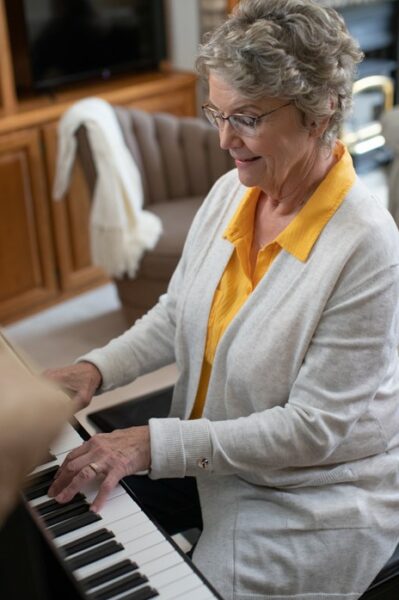“I never thought I was ever going to hear that again.” Nancy loved the sound processors she’d worn for nine years. However, it’s the latest technology that has allowed her to truly enjoy music again, the clarity to play her beloved piano, and to make memories with her grandson. However, as Nancy’s hearing deteriorated and she felt increasingly isolated, playing her beloved piano was no longer something she was able to enjoy. “Hearing aids work wonders for a lot of people, but with my profound hearing loss, I was pretty much just getting by,” says Nancy. “It was one year to the day that I had totally given up that I had my first Cochlear surgery. It transformed me. It gave me my life.”
What Nancy noticed when she upgraded her sound processor
Nancy thought her Cochlear™ Nucleus® 6 Sound Processors “were the cat’s pajamas,” but when she upgraded to the Nucleus 8 Sound Processor, she immediately noticed the difference in comfort and size, and appreciated the new features.
“The Nucleus 8 Sound Processor, it was so easy. I put them on and I could tell the difference right away. And I thought, ‘Wow’ − that’s a magnificent feeling right there.”
Unlike her older devices, the Nucleus 8 Sound Processors enabled Nancy to directly stream music from her compatible smartphone and that got her thinking about other possibilities.
“The N8s connect directly with my phone. I can listen to music, and it has an app. Then I thought ‘Hmm, I wonder about my piano’,” says Nancy.
The benefits of ForwardFocus
While the ForwardFocus1 feature is designed to reduce unwanted background noise so you can better hear the conversation in front of you, Nancy has found that it also allows her to focus on the notes she is playing on the piano. ForwardFocus can either be automatic, as enabled by your clinician, or operated manually by toggling a button on and off in the Nucleus Smart App on your phone, as Nancy does.
“So, I put on the ForwardFocus and started playing. I thought, ‘Holy cats!’,” says Nancy of the difference in sound quality she was hearing from her piano. “I never thought I was ever going to hear that again.” Now Nancy is enjoying playing music with family again: “My grandson, when he started playing the viola, it’s gorgeous sound. And I would always tell him, he was helping me with my music rehab.”
hat else could you do to help you start enjoying music again? Here are a couple of quick tips:
1. Listen to familiar songs and melodies
You can listen to music anywhere, but research shows that directly streaming music from your compatible2 Android™ or Apple™ phone to the latest Nucleus sound processor(s) can offer the proven benefits of greater clarity.345
2. Practice listening daily
As the old adage goes, persistence pays off and so, practicing often will help your progress. Listening practice should be broken up into short, but frequent sessions. Try doing this for 10-15 minutes a day, five days a week. A good idea is to schedule this into your calendar as a reminder around work and other commitments.
Are you interested in finding out more about the Nucleus 8 Sound Processor? Find out more.
- ForwardFocus can only be enabled by a hearing implant specialist. It should only be activated for users 12 years and older who are able to reliably provide feedback on sound quality and understand how to use the feature when moving to different or changing environments. It may be possible to have decreased speech understanding when using ForwardFocus in a quiet environment.
- The Nucleus 8 Sound Processor is compatible with Apple and Android devices. For compatibility information and devices visit www.cochlear.com/compatibility and www.resound.com/compatibility
- Wolfe J, et al. Evaluation of a wireless audio streaming accessory to improve mobile telephone performance of cochlear implant users. International Journal of Audiology. 2016;55(2):75-82.
- Wolfe J, et al. Improving hearing performance for cochlear implant recipients with use of a digital, wireless, remote-microphone, audio-streaming accessory. J Am Acad Audiol. 2015 Jun;26(6):532-9.
- Warren C, Nel E, and Boyd P. Controlled comparative clinical trial of hearing benefit outcomes for users of the Cochlear™ Nucleus® 7 Sound Processor with mobile connectivity.

